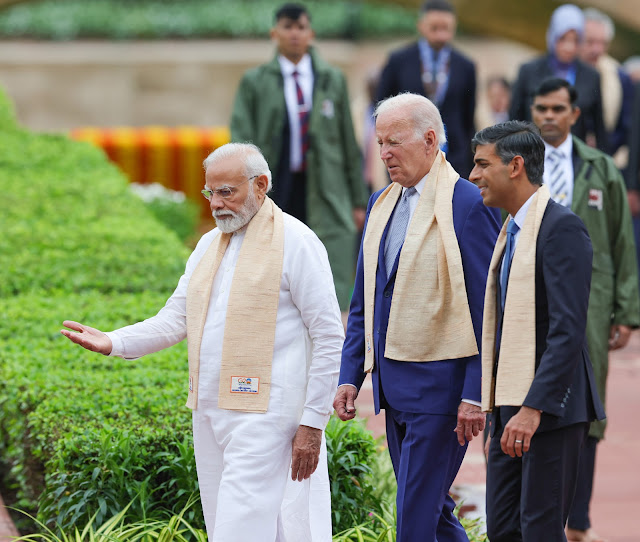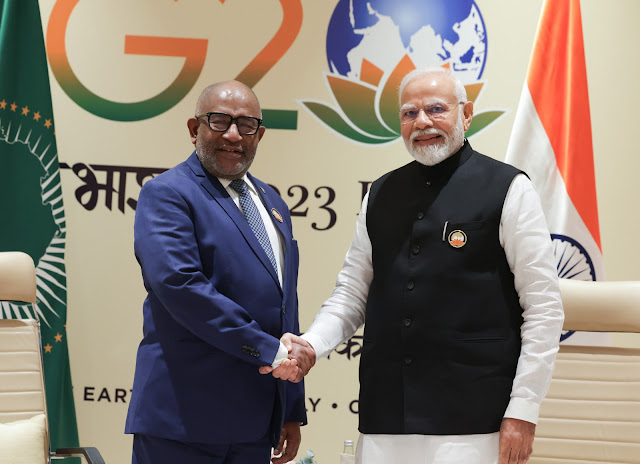The G20 summit is an annual meeting of the leaders of the world's 20 largest economies. It is a forum for these countries to discuss and coordinate their economic policies, and to address global challenges such as climate change, terrorism, and financial instability.
The G20 Summit in Delhi: India's Moment on the World Stage
This year, the G20 summit was held in Delhi, India, from September 9-10. It will be the first time that India has hosted the summit. This is a significant event for India, as it demonstrates the country's growing economic and political clout.India is a rising power in the world, and its role in the G20 is likely to become increasingly important in the years to come. The country is a major player in the global economy, and it is also a key player in many of the world's most pressing challenges.
Let us discuss what was the major highlight of the G20 event held in New Delhi.
A historic moment in the Global Energy Sector: Global Biofuels Alliance (GBA) announced at the G20 event
The global energy sector has witnessed a historic moment today with the announcement of the Global Biofuels Alliance (GBA) by Prime Minister Shri Narendra Modi on the sidelines of the G20 Summit.GBA is an India-led Initiative to develop an alliance of Governments, International organizations, and Industry to facilitate the adoption of biofuels. Bringing together the biggest consumers and producers of biofuels to drive biofuel development and deployment, the initiative aims to position biofuels as a key to energy transition and contribute to jobs and economic growth.
Prime Minister Shri Narendra Modi
along with the leaders of Singapore, Bangladesh, Italy, USA, Brazil, Argentina,
Mauritius, and UAE, launched the Global Biofuel Alliance on 9 September 2023,
on the sidelines of the G20 Summit in New Delhi.
The announcement of the GBA showcases the action-oriented nature of India’s positive agenda as G20 President and representing the “Voice of the Global South’’.
GBA will support the worldwide development and deployment of sustainable biofuels by offering capacity-building exercises across the value chain, technical support for national programs, and promoting policy lesson-sharing. It will facilitate mobilizing a virtual marketplace to assist industries, countries, ecosystem players, and key stakeholders in mapping demand and supply, as well as connecting technology providers to end users. It will also facilitate the development, adoption, and implementation of internationally recognized standards, codes, sustainability principles, and regulations to incentivize biofuels adoption and trade.
The initiative will be beneficial for India on multiple fronts. GBA as a tangible outcome of the G20 presidency, will help strengthen India’s position globally. Moreover, the alliance will focus on collaboration and will provide additional opportunities to Indian industries in the form of exporting technology and exporting equipment.
It will help accelerate India’s existing biofuel programs such as PM-JIVAN Yojna, SATAT, and GOBARdhan scheme, thereby contributing to increased farmers’ income, creating jobs, and overall development of the Indian ecosystem. The global ethanol market was valued at USD 99.06 billion in 2022 and is predicted to grow at a CAGR of 5.1% by 2032 and surpass USD 162.12 billion by 2032. As per IEA, there will be 3.5-5x biofuels growth potential by 2050 due to Net Zero targets, creating a huge opportunity for India.
Countries and organizations that have already joined GBA
19 countries and 12 international organizations have already agreed to join.
G20 countries (07) supporting GBA: 1. Argentina, 2. Brazil, 3. Canada, 4. India 5. Italy, 6. South Africa, 7.USA
G20 Invitee Countries (04) supporting GBA: 1. Bangladesh, 2. Singapore, 3. Mauritius, 4. UAE
Non G20 (08) supporting GBA: 1. Iceland, 2. Kenya, 3. Guyana, 4. Paraguay, 5. Seychelles, 6. Sri Lanka, and 7. Uganda has agreed to be an initiating member of GBA, and 8. Finland
International organizations (12): World Bank, Asian Development Bank, World Economic Forum, World LPG Organization, UN-Energy for All, UNIDO, Biofutures Platform, International Civil Aviation Organization, International Energy Agency, International Energy Forum, International Renewable Energy Agency, World Biogas Association.
GBA Members constitute major producers and consumers of biofuels. USA (52%), Brazil (30%), and India (3%), contribute about 85% share in production and about 81% in consumption of ethanol.
Countries and organizations that have already joined GBA
19 countries and 12 international organizations have already agreed to join.
G20 countries (07) supporting GBA: 1. Argentina, 2. Brazil, 3. Canada, 4. India 5. Italy, 6. South Africa, 7.USA
G20 Invitee Countries (04) supporting GBA: 1. Bangladesh, 2. Singapore, 3. Mauritius, 4. UAE
Non G20 (08) supporting GBA: 1. Iceland, 2. Kenya, 3. Guyana, 4. Paraguay, 5. Seychelles, 6. Sri Lanka, and 7. Uganda has agreed to be an initiating member of GBA, and 8. Finland
International organizations (12): World Bank, Asian Development Bank, World Economic Forum, World LPG Organization, UN-Energy for All, UNIDO, Biofutures Platform, International Civil Aviation Organization, International Energy Agency, International Energy Forum, International Renewable Energy Agency, World Biogas Association.
GBA Members constitute major producers and consumers of biofuels. USA (52%), Brazil (30%), and India (3%), contribute about 85% share in production and about 81% in consumption of ethanol.
Partnership for Global Infrastructure and Investment (PGII) &
India-Middle East-Europe Economic Corridor (IMEC)
The event aimed at unlocking greater investment for infrastructure development and strengthening connectivity in its various dimensions between India, the Middle East, and Europe.
Leaders of the European Union, France, Germany, Italy, Mauritius, UAE, and Saudi Arabia, as well as the World Bank, participated in the event.
PGII is a developmental initiative aimed at narrowing the infrastructure gap in developing countries as well as help towards accelerate progress on SDGs globally.
The IMEC comprises of an Eastern Corridor connecting India to the Gulf region and a Northern Corridor connecting the Gulf region to Europe. It will include a railway and ship-rail transit network and road transport routes.
In his remarks, the Prime Minister highlighted the importance of physical, digital, and financial connectivity. He said that IMEC would help promote economic integration between India and Europe.
An MOU on IMEC was signed by India, the USA, Saudi Arabia, UAE, the European Union, Italy, France, and Germany.
The Prime Minister, Shri Narendra Modi along with the leaders of G20 member nations paid homage to Mahatma Gandhi at the iconic Rajghat today. He underlined that Gandhi Ji’s timeless ideals guide the collective vision for a harmonious, inclusive, and prosperous global future.
G20 nations Leaders pay homage to Mahatma Gandhi at Raj Ghat
Gandhi Ji’s timeless ideals guide our collective vision for a harmonious, inclusive, and prosperous global future: PMThe Prime Minister, Shri Narendra Modi along with the leaders of G20 member nations paid homage to Mahatma Gandhi at the iconic Rajghat today. He underlined that Gandhi Ji’s timeless ideals guide the collective vision for a harmonious, inclusive, and prosperous global future.
“At the iconic Rajghat, the G20 family paid homage to Mahatma Gandhi - the beacon of peace, service, compassion, and non-violence.
As diverse nations converge, Gandhi Ji’s timeless ideals guide our collective vision for a harmonious, inclusive, and prosperous global future.”
African Union included as a permanent member in G20
India's efforts paid off when the African Union was included as a permanent member in the G20 event. All members of G20 supported the African Union's inclusion in G20. Now G20 becomes G21.
The Future Role of India in World Politics
India's growing economic and political clout is likely to see it play an increasingly important role in world politics in the years to come. The country is already a major player in the global economy, and it is also a key player in many of the world's most pressing challenges.
As India's power grows, it is likely to become more assertive in its foreign policy. The country is likely to play a more active role in regional and global affairs, and it is likely to challenge the status quo on a number of issues.
India is also likely to become a more important player in the G20. The country is already a member of the G20, but its role is likely to become more prominent in the years to come. India is likely to use its position in the G20 to promote its interests and to shape the global agenda.
The rise of India is a significant development in world politics. The country is a major player with a growing global influence. Its role in the world is likely to become increasingly important in the years to come.
The Significance of the G20 in Today's World Order
The G20 is the premier forum for international economic cooperation. It is composed of the world's 20 largest economies, which together account for about 80% of global GDP.
The G20 was created in 1999 in response to the Asian financial crisis. The goal of the G20 is to promote global economic stability and sustainable growth.
The G20 summit is held annually, and it is attended by the leaders of the member countries. The summit is a forum for the leaders to discuss and coordinate their economic policies, and to address global challenges such as climate change, terrorism, and financial instability.
The G20 is a powerful forum for shaping the global agenda. The decisions made at the G20 summit have a significant impact on the global economy and on the lives of billions of people.
The G20 is a vital institution in today's world order. It is essential for promoting global economic stability and sustainable growth, and for addressing the world's most pressing challenges.
I hope this blog post has been informative. Thank you for reading!
************************************************










